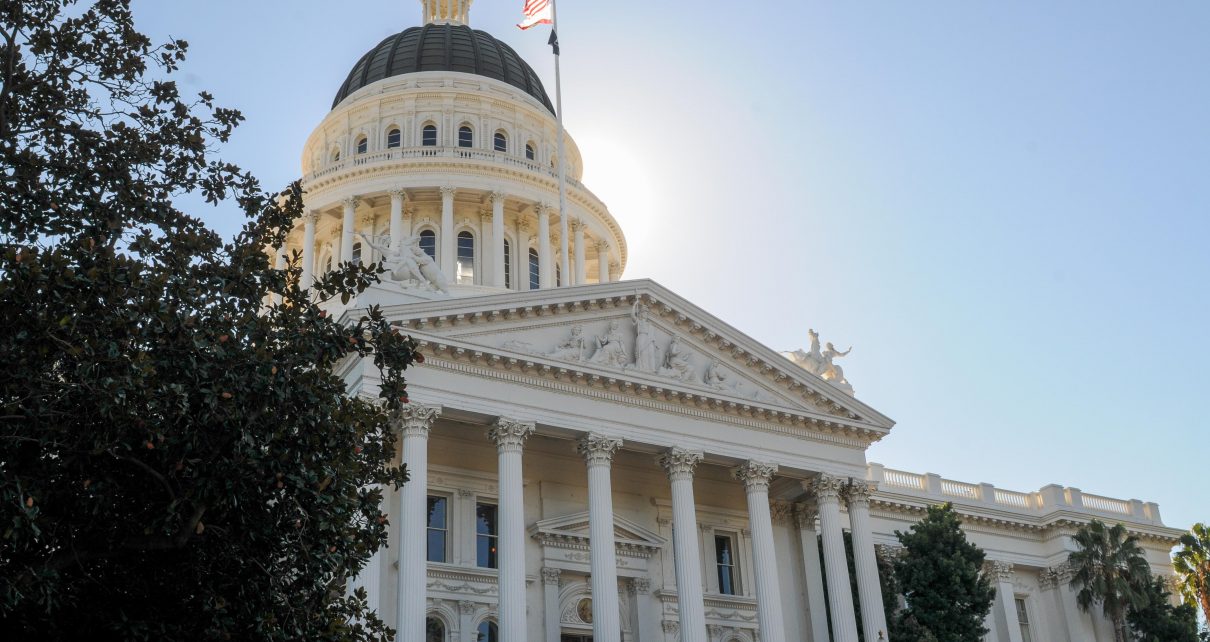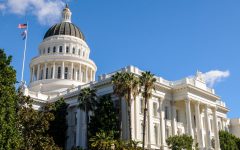
California State Capitol. (Photo: Kevin Sanders for California Globe)
Privileges and Penalties of State Militia
Prohibits a person from discriminating against a member of the military or naval forces of the state
By Chris Micheli, January 12, 2025 2:30 am
Military and Veterans Code Division 2, Part 1, Chapter 7, provides privileges and penalties for the state militia. Section 389 defines the following terms: “temporary military leave of absence,” “public employee, “public agency,” “armed forces,” and “recognized military service.”
Section 390 states that no person belonging to or on duty with the active militia of the state, or engaged in the performance of military duty on call of the Governor or in pursuance of an order of the President of the United States can be arrested on any civil process while going to, remaining at, or returning from any place at which he may be required to attend for military duty.
Section 391 provides that every member of the active militia, on active military orders, is exempt from road tax and head tax of every description, from jury duty, including service on coroners’ juries, and from service on any posse comitatus, if the member furnishes a copy of their active military orders or a letter from their immediate commanding officer or the Office of the Staff J udge Advocate.
Section 392 prohibits members of the militia in the active service of the state from being liable civilly or criminally for any act or acts done by them in the performance of their duty, except those done outside the performance of their military duty.
Section 393 states that, in an action or proceeding of any nature commenced in any court against an active member of the militia or a member of the militia in active service in pursuance of an order of the President of the United States as a result of a state emergency for an act done by the member in an official capacity in the discharge of duty, or an alleged omission to do an act which it was the member’s duty to perform, the defendant in all cases may make a general denial and give special matter in evidence, and a defendant in whose favor a final judgment is rendered in any the action or proceeding recovers treble costs. And, the Attorney General defends the active member or person where the action or proceeding is civil.
Section prohibits a person from discriminating against a member of the military or naval forces of the state or of the United States because of that membership. A member of the military forces cannot be prejudiced or injured by a person, employer, or officer or agent of a corporation, company, or firm in terms, conditions, or privileges with respect to that member’s employment, position or status or be denied or disqualified for employment by virtue of membership or service in the military forces of this state or of the United States.
A person is prohibited from refusing entrance to a member of the Armed Forces of the United States or of the military or naval forces of this state into any public entertainment or place of amusement or into any of the places described in Sections 51 and 52 of the Civil Code because that member wears the uniform of the organization to which the member belongs.
An employer or officer or agent of a corporation, company, or firm, or other person, is prohibited from discharging a person from employment because of the performance of any ordered military duty or training or by reason of being a member of the military or naval forces of this state or of the federal reserve components of the Armed Forces of the United States.
A private employer or officer or agent of a corporation, company, or firm, or other person, cannot restrict or terminate any collateral benefit for employees by reason of an employee’s temporary incapacitation incident to duty in the National Guard, State Guard, or Naval Militia or the federal reserve components of the Armed Forces of the United States. The terms “temporary incapacitation” and “benefit” are defined.
A person who provides lending or financing is prohibited from discriminating against a person with respect to the terms of a loan or financing, including, but not limited to, the finance charge, based on that person’s membership in the military or naval forces of this state or of the United States. A person violating this section is guilty of a misdemeanor and can be held civilly liable for violation of any of these provisions.
Section 394.5 states that any employee of any corporation, company, or firm, or other person, who is a member of the reserve corps of the armed forces of the United States or of the National Guard or the Naval Militia is entitled to a temporary leave of absence without pay while engaged in military duty ordered for purposes of military training, drills, encampment, naval cruises, special exercises or like activity as such member, providing that the period of ordered duty does not exceed 17 calendar days annually including time involved in going to and returning from the duty.
Section 395 states that any public employee who is a member of the reserve corps of the Armed Forces of the United States or of the National Guard or the Naval Militia is entitled to a temporary military leave of absence as provided by federal law while engaged in military duty ordered for purposes of active military training, inactive duty training, encampment, naval cruises, special exercises, or like activity, providing that the period of ordered duty does not exceed 180 calendar days, including time involved in going to and returning from that duty.
Section 395.01 specifies that any public employee who is on temporary military leave of absence for military duty ordered for purposes of active military training, inactive duty training, encampment, naval cruises, special exercises, or like activity as such member, provided that the period of ordered duty does not exceed 180 calendar days including time involved in going to and returning from the duty, and who has been in the service of the public agency from which the leave is taken for a period of not less than one year immediately prior to the day on which the absence begins, is entitled to receive their salary or compensation as a public employee for the first 30 calendar days of the absence.
Section 395.20 provides that every officer and employee of a public agency who is on military leave other than temporary military leave of absence who has been in the service of such public agency for a period of not less than one year immediately prior to the date on which the absence begins is entitled to receive his salary or compensation as such officer or employee for the first 30 calendar days while engaged in the performance of ordered military duty. The terms “officer” and “employee” are defined.
Section 395.03 provides that no more than the pay for a period of 30 calendar days is allowed for any one military leave of absence or during any one fiscal year, except as otherwise authorized by resolution of the legislative body of a public agency or as provided in a memorandum of understanding reached with an employee organization.
Section 395.04 specifies that, during the time that as an officer or enlisted person of the California National Guard, who is on full-time active duty in the military service of the state, and is engaged, with the approval of the Adjutant General, in the military service of the state in attendance at drills, camps, or special exercises, sponsored by federal authority or by the United States Department of Defense, as a member of the National Guard of the United States, he or she must receive salary, pay, and compensation.
Section 395.05 states that any public employee who is a member of the National Guard is entitled to absent himself from his duties or service, without regard to the length of his public service, while engaged in the performance of ordered military or naval duty and while going to and returning from duty, provided the duty is performed during the time as the Governor may have issued a proclamation of a state of extreme emergency or during the time as the National Guard may be on active duty in one or more of the situations provided the absence does not exceed the duration of the emergency.
During the absence of such officer or employee while engaged in such military service during such emergency and while going to and returning from such duty, and for a period not to exceed 30 calendar days, he must receive his salary or compensation as the officer or employee and not be subjected by any person directly or indirectly by reason of the absence to any loss or diminution of vacation or holiday privilege or be prejudiced by reason of such absence with reference to promotion or continuance in office, employment, reappointment to office, or reemployment.
Section 395.06 requires a private employer to consider a former employee who meets the specified requirements as having been on a leave of absence during any period of the former employee’s active service in the National Guard of any state. To be eligible for the employment protections specified, the former employee is required to meet all of the five specified requirements.
If any employer fails or refuses to comply with this section, the superior court of the county in which the employer maintains a place of business may, upon the filing of a motion, petition, or other appropriate pleading by the person entitled to the benefits of this section, specifically require the employer to comply with this section and compensate the person for any loss of wages or benefits suffered by reason of the employer’s unlawful action.
Section 395.2 specifies that any employee of a board of school trustees or board of education in a position not requiring certification qualifications who enters the active military service of the United States of America or of the State of California, during any period of National emergency declared by the President of the United States of America or during any war in which the United States of America is engaged, regains all rights to his position and is reinstated upon his application at any time within six months of the termination of that service, but in any event within one year from the date of a treaty of peace terminating the hostilities in which the United States is now engaged.
Section 395.3 provides that, in the event that any public officer or employee has resigned or resigns their office or employment to serve or to continue to serve in the Armed Forces of the United States or in the militia of this state, they have a right to return to and reenter the office or employment prior to the time at which their term of office or their employment would have ended if they had not resigned, on serving a written notice to that effect upon the authorized appointing power.
The phrase “public officers and employees” is defined to include four specified types of persons. The right of reentry into public office or employment provided for in this section includes the right to be restored to the civil service status as the officer or employee would have if they had not resigned. Another person cannot acquire civil service status in the same position so as to deprive the officer or employee of their right to restoration.
Section 395.4 states that, whenever the United States is engaged in war or whenever the Governor finds and proclaims that an emergency exists in preparing for the National defense, any employee or officer, other than an elected officer, of a county, city, political subdivision, school, irrigation, public district, or other local authority or public body whatsoever who enters the armed forces of the United States is entitled to a leave of absence for service with the armed forces for the duration of the war or until the Governor finds and proclaims that the emergency no longer exists, and for 90 days thereafter, or until 90 days after the termination of the service.
Section 395.5 requires the Military Department to comply with the provisions of the Uniformed Services Employment and Reemployment Rights Act (USERRA).
Section 395.6 authorizes the Governor to appoint a mediator in their office to take complaints, regarding possible violations or other issues dealing with USERRA and to resolve and coordinate the resolution of those complaints or issues, from state employees who satisfy specified criteria.
In addition, each state agency and department may appoint a mediator to take complaints regarding possible violations of USERRA and other issues relating to state pay, and to resolve and coordinate the resolution of those complaints with the assistance of the Governor-appointed ombudsperson, from employees of that department or agency who are members of either the California National Guard or a reserve component of the Armed Forces of the United States.
Section 395.8 provides that any officer, elective or otherwise, who leaves the service of any city in order to enter upon active service with the armed forces of the United States must be reinstated and restored to his office upon his discharge or release from their active service with the armed forces; provided, the discharge or release is prior to the expiration of the term for which he has been elected or appointed.
Section 395.9 specifies that any public employee and any employee of a corporation, company, firm, or other person who is a member of the State Guard is entitled to a temporary military leave of absence without pay while engaged in military duty for purposes of military training, drills, unit training assemblies, or similar inactive duty training for not to exceed 15 calendar days annually, including time involved in going to and returning from that duty.
Section 395.10 requires a qualified employer to allow a qualified employee to take up to 10 days of unpaid leave during a qualified leave period. The terms “period of military conflict,” “qualified employee,” “qualified employer,” “qualified member,” and “qualified leave period” are defined.
Section 396 states that the commanding officer of any portion of the militia parading or performing any military duty in any street or highway may require persons in a street or highway to yield the right of way to such militia, except that the carriage of the United States mail, the legitimate functions of the police, and the progress and operations of hospital ambulances, fire engines, and fire departments and apparatus shall not be interfered with thereby.
Section 397 specifies that, when an emergency has been declared to exist by the Governor, any person belonging to the military or naval forces of the State or of the United States must be allowed to pass free through all tollgates and over all toll bridges and all ferries, if he presents an order for duty in the military or naval service of the State or of the United States.
Section 398 states that any person who trespasses upon any campground, armory, airport, or other place devoted to military duty, or who in any way or manner interrupts or molests the orderly discharge of military duty, or who disturbs or prevents the passage of troops going to or returning from any duty is guilty of a misdemeanor and may be placed under arrest by or at the direction of the commanding officer of the troops or of the place concerned.
Section 399 requires the Secretary of the California Department of Veterans Affairs to assist any eligible member or veteran who returns or has returned to this state in obtaining a best practice health screening test for exposure to depleted uranium. The screening should consist of a bioassay procedure capable of detecting depleted uranium at low levels and discriminating between different uranium isotopes. State funds cannot be used to pay for the tests or any other federal treatment services. This section defines the terms “eligible member,” “member,” “member of the Armed Forces,” and “military physician.”
Section 399.5 requires the Secretary of the California Department of Veterans Affairs to assist any eligible member or veteran who returns or has returned to this state in obtaining an appropriate health screening test for traumatic brain injury and post-traumatic stress disorder. The eligible member or veteran must return or have returned to this state after service.
- Sources of Law - February 26, 2026
- Commercial Fishing - February 26, 2026
- Are These Extra Words Needed in California Statutes? - February 25, 2026




One thought on “Privileges and Penalties of State Militia”